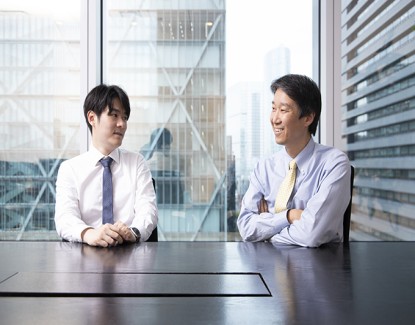Market Commentary and Fund Performance
Masa Takeda of Tokyo-based SPARX Asset Management Co., Ltd., sub-advisor to the Hennessy Japan Fund, shares his insights on the Japanese market and Fund performance.
-
 Masakazu Takeda, CFA, CMAPortfolio Manager
Masakazu Takeda, CFA, CMAPortfolio Manager
Fund Performance Review
In July, the Fund (HJPIX) gained 8.16%, outperforming its benchmark, the Russell/Nomura Total Market Index, which rose by 6.45%.
The month’s positive performers among the Global Industry Classification Standard (GICS) sectors included shares of Industrials, Consumer Discretionary and Information Technology. No sectors detracted from the Fund’s performance during the month of July.
Among the best performers were our investments in Recruit Holdings, Japan’s unique print and online media giant specializing in classified ads as well as providing human resources services, Keyence Corporation, the supplier of factory automation related sensors, and Misumi Group Inc., the maker and distributor of metal mold components and precision machinery parts.
Click here for full, standardized Fund performance.
As for the laggards, Mitsubishi Corporation, the largest trading company in Japan, Tokio Marine Holdings, Inc., Japan’s largest general insurance group, and Ariake Japan, a producer of natural seasonings and flavorings from meat products, detracted from the Fund’s performance.
The Fund continues to remain invested in its long-term holdings in growth names, but we have also been adding several new names to the portfolio lately, which we consider to contribute to more risk diversification and be of attractive valuation relative to their growth prospects. Tokio Marine, the stock we highlighted in last month’s letter as “growth stock in disguise,” was one such example. This month, we are going to introduce ORIX, which had been on our radar screen for many years.
Within the Fund’s long-term positions, we will keep them balanced between high-quality businesses with manufacturing excellence in industries like industrials (Keyence, Nidec, etc.), consumer products (Rohto, Kao, etc.) and medical devices
(Terumo, etc.) as well as those with differentiated strengths in intangible assets like entertainment content (Sony Group), network effects (Recruit) and software (Hitachi), all of which have extremely long growth runways, in our view.
ORIX is Japan’s largest non-bank comprehensive financial services company. It was established in 1964 as a leasing company, but subsequently diversified into a broad range of fields including aircraft leasing, property development, asset management, banking, life insurance, private equity, venture capital, renewable energy investment, airport concession, and so on. It also has a global footprint with roughly half of the earnings generated overseas.
Using the growth rate of book value per share (net asset value per share) as a proxy for the growth rate of intrinsic value, ORIX has grown at 7-10% per annum over the last 5 and 10 years. During its history since 1964, it has never reported a net loss.* In terms of shareholder return policy, management is committed to a 33% payout ratio, which equates to a dividend yield of 4% at the current share price. On top of this, management have repeatedly stated that, in the event there are not enough attractive business opportunities to use up available capital, they will return it to the shareholders in the form of share buybacks, and they have been acting on this. In the last three years, the share count has decreased at a rate of 2-3%, which helps to augment the earnings growth rate on a per share basis. At the current valuation of 8x forward P/E and 0.8x price to book (P/B) (return on equity 10%), we believe the management is conducting capital allocation in a very rational manner.
ORIX’s sustainable growth rate, therefore, is in the mid-single digit range. As a shareholder, you get dividend yields of 4% at present with further upside potential in dividend per share as the business grows, and lastly, they can constantly buy back shares if need be, which helps to raise earnings per share. Many of our other growth-oriented long-term portfolio holdings have higher expected earnings compounded annual growth rates (CAGR) but negligible share buybacks and meager dividend yields.
Moreover, over the next three years, ORIX may see faster growth in earnings. The company’s mid-term outlook calls for 12% CAGR from net profit (NP) 312.1bn yen ($2.3bn) to NP440bn yen ($3.3bn) by FY March 2025. This is primarily due to expected recovery in the pandemic-stricken business lines such as hotel operation, aircraft leasing, and airport concession businesses. These business lines reported a segment loss of 22bn yen ($163.7mn) in FY2021 but the company expect that such businesses should recover to at least 60bn yen ($446.4bn) in three years assuming the normalization of businesses back to pre-COVID levels. This seems to reasonably achievable to us. Thus, the overall profit is likely to be 40% higher than FY2021 accompanied by higher ROE, which may provide upside to the current valuation multiples. As a long-term investor, we intend to hold this company as long as its fundamentals remain promising.
Click here for a full listing of Holdings.
* One blemish is that in the aftermath of the 2008 global financial crisis, the company had to issue new equity, which resulted in 20% dilution, in order to allay market’s concern about its ability to tap the capital markets for fund raising. We take it that management learned a lesson from this.
- In this article:
- Japan
- Japan Fund
You might also like
-
 Portfolio Perspective
Portfolio Perspective
Japan Small Cap FundA Focus on Japanese Small-Caps Making Big Corporate Improvements
 Takenari Okumura, CMAPortfolio Manager
Takenari Okumura, CMAPortfolio Manager Tadahiro Fujimura, CFA, CMAPortfolio ManagerRead the Commentary
Tadahiro Fujimura, CFA, CMAPortfolio ManagerRead the CommentaryThe Portfolio Managers discuss their view of the Japanese small-cap corporate landscape amid many shifting factors, including a new Prime Minister, finalized tariff situation, currency volatility, and attractive valuation environment.
-
 Portfolio Perspective
Portfolio Perspective
Japan FundCompelling Japanese Opportunities Amid Attractive Valuations
 Masakazu Takeda, CFA, CMAPortfolio Manager
Masakazu Takeda, CFA, CMAPortfolio Manager Angus Lee, CFAPortfolio ManagerRead the Commentary
Angus Lee, CFAPortfolio ManagerRead the CommentaryThe Hennessy Japan Fund Portfolio Managers highlight the effect of the new Prime Minister on the economy and market and how holdings were affected by the final trade agreement. They also discuss currency volatility, valuations, and the most compelling opportunities as we end 2025.
-
 Investment Idea
Investment IdeaCompelling Valuations in Japan
 Masakazu Takeda, CFA, CMAPortfolio Manager
Masakazu Takeda, CFA, CMAPortfolio Manager Angus Lee, CFAPortfolio Manager
Angus Lee, CFAPortfolio Manager Tadahiro Fujimura, CFA, CMAPortfolio Manager
Tadahiro Fujimura, CFA, CMAPortfolio Manager Takenari Okumura, CMAPortfolio ManagerRead the Investment Idea
Takenari Okumura, CMAPortfolio ManagerRead the Investment IdeaJapanese equities are currently trading at compelling valuation levels compared to other developed equity markets around the world and relative to their own historical averages. We believe the Japanese market deserves a closer look.
